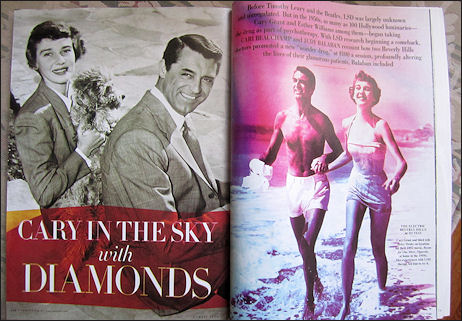Fred Ward tells a joke — familiar now, not so much then — in this scene from Mike Nichols‘ Silkwood (’83). It starts at the 6:18 mark. I’ve told this joke myself for the last 26 or 27 years, but I can never quite tell it with just the right timing and emphasis. The singer, not the song. I made this same point last December.
 Jeffrey Wells
Jeffrey Wells
Cake Frosting
I love the way David Lynch says “When you don’t have final cut, you stand to die the death….die the death.” I don’t like that look of solemn de-emotionalized conviction on Catherine Breillat ‘s face. I’m irritated by the gray-white streaks in Agnes Varda‘s dyed red hair (either embrace au natural or do regular salon visits). And it’s great hearing John Sayles say that “New York-area Hispanics do talk loudly but we don’t like to talk about this.” And I love blonde hair.
Which is a way of saying that I watched Great Directors again last night and really enjoyed the leisurely vibe of it. It’s like going to a party on a Sunday afternoon with several fascinating film directors and everyone not being seized with being funny all the time. If there’s one thing more loathsome than various people sitting around a table and feeling the urge to make each other howl with laughter (and obliging in kind when a table-mate makes the effort), I’d like to know what it is.
Yes, I’m kidding about the Sayles quote but I couldn’t resist.
Just Not Done
This is a minor thing I’m about to complain about, but yesterday I was watching a video of Leonardo DiCaprio talking about shooting portions of Inception in Paris, except he called it “Pair-iss.” And at that moment the ghosts of Arthur Rimbaud, Honore de Balzac, Edith Piaf and Yves Montand howled in unison.
DiCaprio was raised in East Hollywood, Los Feliz, and Echo Park areas of Los Angeles, and has a kind of twangy, flagrantly non-boarding-school accent. I’m not trying to make this into a huge thing but as soon as I heard “Pair-iss” I said to myself, “Good God…that’s as bad as saying Eye-rack or Eye-talian.” It’s as bad as American grunts going to Paris in World War II and calling Pigalle, the Parisian prostitute district just south of Montmartre, “Pig Alley.”
For those smirking because they themselves say “Eye-rack,” the way to pronounce it (for the eighth or ninth time) is either “Uhr-rahq,” which is how the natives say it, or “Ihr-rahq,” which is how I say it. And with the accent on the second syllable. Anyone who says “Eye-rack” needs to get a clue because they sound like Clarence P. Muckle from Hayseed, Nebraska.
I’m Not There
There’s a certain kind of mannered “attitude acting” among under-30 actresses that’s been driving me vaguely nuts for the last decade or so. Megan Fox heavily relies on this affected speaking style (as the video below indicates) but real actresses like Amanda Seyfried and Zoe Kazan resist it. It’s a style of delivery and a tone of voice that basically conveys mock-haughty, insolent smirk and contemptuous put-on.
It’s basically an underlying attitude that says “what you’re saying right now is, like, such a turn-off for me? It’s such a total turn-off, I mean, that I’ve decided to eliminate even the faintest trace of emotional sincerity in my reedy Minnie Mouse voice? As in, like, I’m saying the words but you’re not there and, uhm, neither am I?
“Even when I’m relaxed among friends and just, you know, talking shit and killing time because nobody cares and we’re all hangin’ back? Even then I’m going to use these ‘no way…you’re sitting there and telling me you’re actually serious?’ inflections. Because I can’t help it. It’s part of me and my friends and our whole generational ‘you are so not getting through to me’ attitude.
“So when things get dramatic and confrontational in a movie I’m going to just, like, cock my head and arch my eyebrows and speak in a beyond cynical, convulsed-with-disgust ‘I can’t believe I’m lowering myself to even speak to you’ sing-songy tone and pretend to be someone else in a ‘how dumb or disgusting can you be because I’m, like, so pretending to be someone else right now’? sort of way.
“Or else I’ll faintly smile and use one of those serene-robot gazes as I pledge loyalty or compliance or obedience. Which we both know is total bullshit but it’s fun to pretend to be a fake Stepford wife as a way of letting you know that’ll never happen.
“Because my contempt for you and guys who always seem to say the kind of stuff you’re saying has become, like, extra-refined. I’ve got an attitude shell that you’ll never penetrate…forget it. Even when I’m throwing my head back and laughing with my friends at Starbucks, it never leaves.”
This speaking style is so persistent and widespread that it obviously comes from within in a cultural-generational sense that’s almost, well, genetic. It’s noticable among both genders but particularly, or so it seems, among younger women. It’s related to generic Minnie Mouse mall-speak, which you never used to hear in the ’70s or ’80s or ’90s but is absolutely ubiquitous now.
If I was an acting teacher I would tell my female GenY students to completely rid themselves of this “I’m not there” tone in their speaking manner — to identify it and slaughter it and bury the carcass deep. I would make them watch DVD clips of real actresses letting go in a real way until the differences between emoting from the heart (or at least from an intelligent mind with the use of a sizable vocabulary) and smugly mannered squeak-squeak “attitude acting” is coming out of their ears.
Well Enough?
So M. Night‘s Airbender had $33 million as of last night, and is probably looking at $64 or $65 million by Sunday night. So once more, horrible reviews didn’t seem to matter much. $65 million seems relatively decent for a four-day run, especially given the young-kid demographic. Perhaps not enough to match or surpass the cost of making and marketing Airbender within a desired timeframe, but still.
Stalloney
Marshall Fine has written a profile of Expendables auteur Sylvester Stallone for Cigar Afcionado, the super-slick, exuding-the-’90s older-guy magazine that doesn’t believe in offering online samples or one-time-only online access. Fine was good enough to supply the first 400 or so words.

“Sylvester Stallone aims a remote-control device at the flatscreen TV in his Beverly Hills production office, and an image pops up from a documentary about the making of his newest film, The Expendables.
“It shows Stallone — still in remarkable shape at 63 — being body-slammed into a brick wall in the catacombs of what is supposed to be the capital of a Latin American island republic. Stallone, a solidly built 5-foot-10 with what looks to be about 4 percent body fat, is the slammee – and the slammer is the massive Stone Cold Steve Austin of World Wrestling Entertainment fame, a daunting 6-foot-2 and 250 pounds of manhandling brutality.
“A cloud of dust rises — and as it settles, Stallone calls cut, then says, “Shit,” puts a hand to the back of his neck, and walks off the set.
“Back in his office, Stallone hits pause on the remote, then reaches into a drawer in his desk, rummages around in a file and comes up with an x-ray: his neck, with what looks like a small clothespin on one of the vertebrae.
“‘I’ve got a bolt in my neck where he cracked the vertebrae,’ Stallone says. Then he flicks the DVD back into action: It’s Stallone, looking at an MRI of his shoulder from the same hit, with a doctor telling him he needs surgery to correct the blown rotator cuff he also suffered.
“‘I knew it was really fucking bad,’ Stallone says, indicating the image on the TV screen. ‘The doctor wanted to fix my neck and my shoulder right then. But that would have meant closing down the movie.’
“Stallone eventually had a quartet of surgeries to repair the damage that comes from doing 90 percent of your own stunts – but not until after filming was complete. The Expendables, set to open in mid-August, never halted production for Stallone to have his injuries repaired.
“‘I just wanted to do something original, something physical, something that would keep me young in the brain – so I don’t have to admit I can’t do this anymore,’ Stallone says with a rueful smile.
“Still, he has another message as well: I’m human. When Stallone escapes Austin’s clutches and gets back to his own men, one of them asks, ‘Where have you been?’
‘Getting my ass kicked,’ comes the reply, with an ‘at least I survived’ shrug.
“As Stallone points out, his first paying job as an actor was in 1970 – which means that, as of 2010, he’s been in the business for 40 years. But in all that time, a Sylvester Stallone character had never uttered those words.”
Fine has seen a rough cut of The Expendables but can’t share, so there.
In and Out

Independence Day decoration on a 19th Century home in Redding, Connecticut — Saturday, 7.3, 12:30 pm. Love those half-moon flags.

Lobster flip-flops — Saturday, 7.3, 8:15 am.

“What’s Your Name?”
I paid $30 dollars earlier today for a Taiwanese DVD of Eliza Kazan‘s Viva Zapata, which has never been on a legitimate domestic DVD. The packaging was low-grade, the copy was crudely written, and the word “remastered” across the top smelled of bullshit. But to my great surprise, this 1952 film looks tolerable. Second-generation, not detailed enough, jumpy action footage, etc. But it could have been much worse. It would be wonderful someday to see a Bluray created from good elements.
Last of Elegant Breed
I didn’t know Ed Limato, the admired ICM, William Morris, ICM and finally WME talent agent who’d had emphysema for a long while, and who slipped away earlier today. Limato apparently wasn’t one to consider, much less invite or nurture, relationships with journalists. But like everyone else I knew his rep as a classy, elegant fellow. Here are tributes by (a) WME story editor Christopher Lockhart, and (b) Indiewire‘s Anne Thompson.
“Limato was old-school,” Thompson writes. “He was courtly, well-mannered, well-spoken, charming. He was blind-sided when Michelle Pfeiffer left him for CAA, but took her departure gently, told her that he understood and that if she changed her mind, he would welcome her back with open arms, no questions asked. He cared. He fussed. He threw tantrums. He apologized. He was not a Sammy Glick. In fact, he was himself — not one of those faceless foot soldiers that have come to populate the streets of Wilshire Boulevard.”
“Where Am I?”
A little Greaser’s Palace never hurt anyone over an Independence Day holiday.
“Some Place I’ve Never Been”
I have to hump it uptown to Grand Central in order to catch a 3:24 pm train to Stamford and then pick up a rental car, etc. Perhaps another posting or two from on the train, but in a few hours the main order of business will be listening to live music and doing a little beer-guzzling at the Georgetown Saloon. Things always ease down during the 4th of July weekend.
Tripping in Hollywood Hills
There’s a fascinating article in the August Vanity Fair (i.e., the Angelina Jolie cover) about the early days of professionally-supervised LSD therapy among the Hollywood elite, with samplers including Cary Grant, Sidney Lumet, Esther Williams and Betsy Drake, beginning in 1958.

This was two or three years before the Harvard University LSD experiments with Timothy Leary and Richard Alpert, and seven years before various rock stars (including the Beatles) first began to drop, and nine or ten years before LSD began to catch on with adventurous middle-class youths in the cities and well-to-do suburbs.
It’s a carefully sculpted, touchingly written piece (particularly with quotes from the first-timers’ experiences, which in some cases were quite illuminating and even profound). The article doesn’t appear to be an excerpt from a book. The authors are Carl Beauchamp and Judy Balaban. Consider the opening four paragraphs:
“Our story is set in the years before Mad Men, when Eisenhower was in the White House and America had only 48 states. Our stage is Beverly Hills, still a small town in 1958, where movie stars and other entertainment-industry figures led active but traditional, even somewhat constrained social lives.
“There was a zone of privacy in that time and place we can’t begin to imagine today. Money, emotional traumas, and personal doubts were simply not discussed, even by the closest of friends. Appearances were accepted as reality, so people kept very busy making sure every aspect of their lives looked correct.
“That didn’t mean having the most lavish house, the heftiest jewels, or the largest private plane, as it came to in later decades. It did mean dressing, behaving and speaking appropriately; appearing to be happily married, in love, or looking for love en route to marriage; not complaining about one’s career or annual income; and being enormously ambitious without evidencing any ambition whatsover.
“Evenings were just as circumspect. Dinners were small A-list gatherings at Chasen’s, Romanoff’s, Don the Beachcomber, or poolside barbecues at private homes. The most visible scandals arose when dancing partners who were married — but not to each other — indulged in excessive caresses or when someone (almost always a man) drank too much, though boozy belligerence and even outright drunkenness were rare to invisible.
“Almost everyone smoked carton-loads of regular cigarettes, but a ‘joint’ was a body part of a lower-class dive. If people were ‘doing lines,’ you’d have guessed they were writing screenplay dialogue or song lyrics. And if you mentioned ‘acid,’ you’d mean citrus juice or a stomach problem.
“Nobody in Hollywood — or almost anywhere else in the United States — had ever heard of LSD, or lysergic acid diathylamide. Timothy Leary wouldn’t even pop his first mushroom until 1960. So it was very out of character that against this background a group of more than 100 Hollywood-establishment types began ingesting little azure pills that resembled cake decorations as an adjunct to psychotherapy.”

